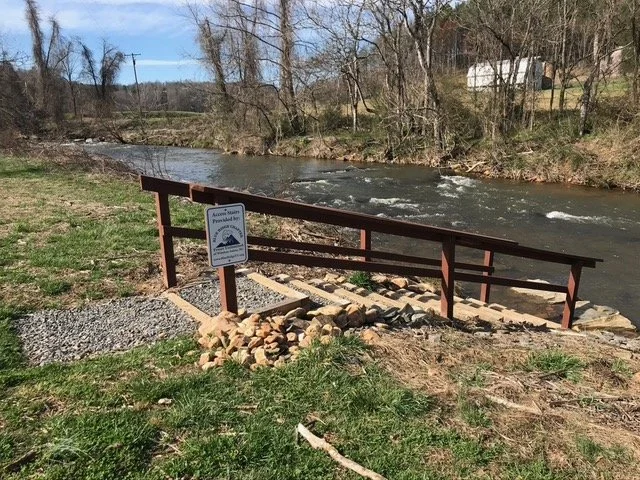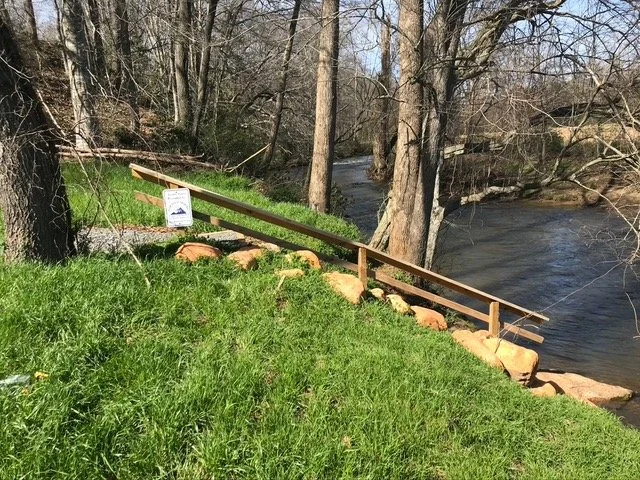For many years locals have enjoyed the beauty and tranquility of the rivers in Surry County while fishing for trout and other species. One of the most prized fishing spots is the Mitchell River in Dobson. Over twenty years ago the North Carolina Wildlife Commission designated a three-mile section of the Mitchell from the Kapps Mill north, a Delayed Harvest stream.
Although a majority of this section of river is privately owned, the landowners have been very generous in providing access to the river and have always practiced strong conservation policies. Bank erosion and the loss of the riparian buffer has always been one of the challenges that concerned the owners. In the fall of 2018 after hurricane Florence had brought record rainfall to the foothill’s region, the Kapps Mill dam located at the southern point of the delayed harvest section was destroyed. There was also severe riverbank and road damage from the flooding.
The Blue Ridge Trout Unlimited chapter in Winston Salem reached out to the landowners to see if they could help with the recovery.
The flooding and high fishing foot traffic up and down the steep banks had caused additional erosion problems and silt entering the stream. The Mitchell River hosted a wild trout population downstream to the delayed harvest as well as the endangered Brook Floater mussel. Reducing and stopping the siltation was the main goal of the chapter as this would enable the wild trout and the Brook Floater mussel to migrate back upstream and thrive. Both require clean cold water to survive. A plan was devised and agreed to by the owners and our chapter to reduce sediment and lower the temperature of the water. The Blue Ridge chapter offered up a plan to provide multiple river access staircases at several locations along the riverbank to reduce foot traffic off the banks to control erosion and siltation. After installing access points our chapter would finish by restoring and replanting the banks. FEMA and the transportation department fixed the roads and parts of the heavily damaged banks. Over the next few years, the Blue Ridge chapter installed 4 stair access points into the river that allow fisherman to go into one and exit out of the other reducing the pressure of the bank foot traffic and thus siltation. Over the last two years our chapter been planting live Willow stakes into eroded banks. This January chapter members planted four hundred trees to provide shade to lower the water temperature and help stabilize the banks.
We have also worked with the Wildlife resources commission on a temperature study of the Mitchell River by installing temperature data loggers at various points in the river. This led to identification of warm water entering the stream from ponds in the Devotion area above the delayed harvest section. After discussion with the owners, our chapter worked with them to change the outflow from one of the big ponds from top surface warm flow to bottom surface piping outflows with colder temperature to go into the Mitchell River. The chapter contributed money to change the piping and the owners spent additional money and effort in channelizing the pond to provide cold water outflow into the Mitchell.
Our Blue Ridge Chapter volunteers have put in thousands of hours in the last few years working on fund raising, planning and restoration efforts.All this work has been possible due to the financial generosity of our members, other chapter TU members, NC Trout Unlimited council and a grant from Trout Unlimited.Please visit our website www.blueridgetu.org to view photos and a video about the restoration, under the restoration tab.
Robby Abou-Rizk, Blue Ridge TU president, Winston-Salem.


